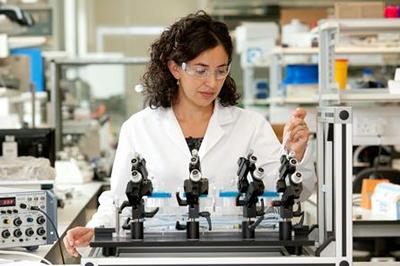Southampton scientist awarded £58k for dementia research

A University of Southampton scientist has just been awarded more than £58,000 by Alzheimer’s Research UK to study chemical signals in the brain in Alzheimer’s disease. The research will study the chemical signals that control learning and memory in an attempt to understand more about Alzheimer’s and search for new treatments.
One of the most common early symptoms of Alzheimer’s is memory loss, caused by a breakdown in communication between nerve cells. Dr Mariana Vargas-Caballero, who set up her own independent research lab at the University of Southampton last year, will train a PhD student to look in more detail at how this communication can break down in the disease.
Dr Vargas-Caballero, is also receiving additional funding for the PhD studentship from the Institute for Life Sciences and the Centre for Biological Sciences at the University. She said: “We are interested in a hallmark Alzheimer’s protein called amyloid, which builds up in the brain during the disease. We believe that amyloid could interfere with the signals that pass between nerve cells, leading to memory loss.”
To study this in more detail, PhD student Sarmi Sri will study nerve cell communication and electrical activity in the brain in mice bred to have amyloid in their brains. By comparing the memory and thinking of mice with amyloid switched on or off, she will build a bigger picture of how communication between nerve cells breaks down when amyloid starts to build up. The team hopes to learn how this contributes to changes in cognition that could explain the early symptoms of the disease.
She said: “We are really interested in whether there is a time window during which nerve cells are particularly vulnerable to damage. Hopefully, our findings will inform new ways to reverse or prevent nerve cell damage in Alzheimer’s, to improve symptoms or slow the disease altogether. We are very grateful to Alzheimer’s Research UK for the opportunity to study this important area.”
Dr Simon Ridley, Head of Research at Alzheimer’s Research UK, said:
“Understanding the early changes in Alzheimer’s disease is important because this is when potential new treatments are likely to be most effective. There is still a lot we do not know about how and why nerve cells die in Alzheimer’s but this knowledge could help us take a crucial step forwards.”
Despite the condition affecting hundreds of thousands of people in the UK, including more than 2,000 in Southampton city alone, research into dementia remains underfunded. Alzheimer’s Research UK funds research into causes, preventions, diagnosis and treatments for dementia, including almost £1m of pioneering research at the University of Southampton.
We are interested in a hallmark Alzheimer’s protein called amyloid, which builds up in the brain during the disease. We believe that amyloid could interfere with the signals that pass between nerve cells, leading to memory loss.